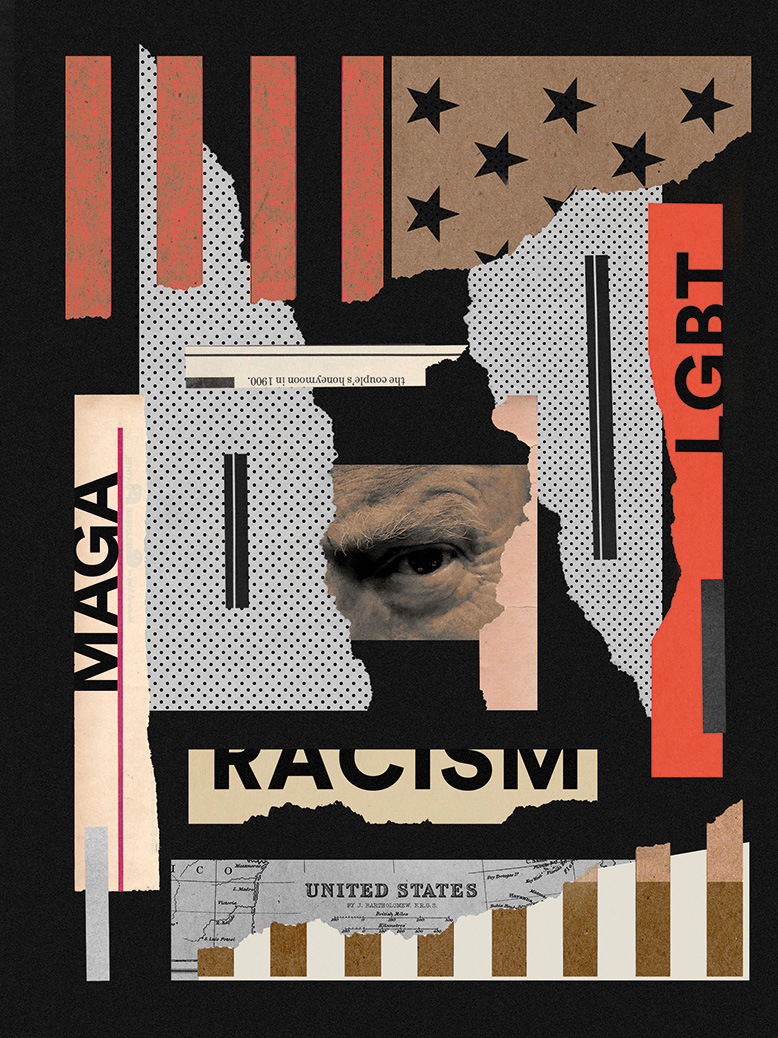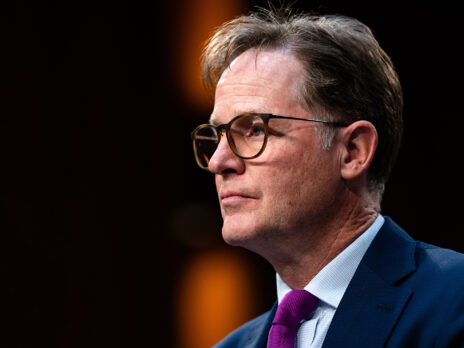In late November, a California judge rejected a demand by several women’s volleyball teams to disqualify a transgender player for San Jose State before this year’s tournament. Six opponents have forfeited games against the team this year rather than collude in what they see as cheating. The larger question of transgender athletes in college sports will be decided later, but the judge is defending a lost cause. Fewer than a quarter of Americans (23 per cent) support allowing transgender athletes to play on women’s teams. Teams that do field trans athletes are sometimes booed off the pitch. Such feelings go a long way towards explaining Donald Trump’s resounding win in November’s presidential elections.
Washingtonians are often asked what it feels like to watch the second age of Trump dawn. Oddly, it does not feel much like his first arrival in 2016. It feels more like Barack Obama’s in 2008 or Bill Clinton’s in 1992 – less a political than a social revolution, in which philosophical habits will be broken along with political hierarchies. This particular social revolution owes most of its energy to a revulsion against woke. That is the source of the new era’s promise and danger.
Trump left office only four years ago. Washington rejected him – somatically, as in a botched organ transplant. Having squeaked into power on an anti-establishment platform, he arrived in the capital to find the establishment bloodied but unbowed. Hostile neighbours on Tennyson Street hung rainbow flags in front of the house where his vice-president Mike Pence was staying during the transition. By the CVS drugstore at Connecticut Avenue and McKinley, activists waved signs at honking motorists throughout December. The day after the inauguration in 2017, over 200,000 women, decked out in “pussyhats” and led by establishment celebrities from Scarlett Johansson to Emma Watson, descended on the Mall. It shook the city: it was the largest collection of protest marchers since the Vietnam War, and drew a considerably larger crowd than the inauguration ceremony. The mood was defiant.
There’s none of that now. The mood in Washington’s progressive neighbourhoods is more one of muttered commiseration. (And they are all progressive neighbourhoods: in the capital city, Harris defeated Trump 93 per cent to 7 per cent.)
The country no longer wants the establishment’s advice on its choice of president. Democrats can blame their own spite. Not content to defeat Trump at the ballot box, as they had in 2020, they set out to defeat him in the courts, lending their support to a number of court cases as election season heated up. They wound up doing grievous harm to their party and country.
One was a civil case against Trump for defamation, in which he was ordered to pay $83m in damages to the claimant, E Jean Carroll, for accusing her of fabricating her allegation that he had sexually assaulted her in the 1990s. In a second civil case, Trump was accused of frauds centred largely on the overvaluation of a New York City apartment on a loan application and ordered to pay $355m.
Elsewhere, in criminal proceedings, Trump was convicted of what Harris and her campaign liked to describe as “34 felonies”. By this, prosecutors meant one perfectly legal hush-money payment, mislabelled by Trump’s accountants as a “lawyer’s fee” – a misdemeanour, even if you assume it was a mislabelling. It was turned into a felony through the use of a never-before-deployed technicality, and multiplied by 34 by turning each monthly instalment into a separate crime.

The result was revolutionary, and not in the way Democrats intended: anyone with a sense of fair play would be tempted to vote for a fellow who had been, as the playwright David Mamet put it, “raided, indicted, convicted, sued, slandered and shot”. But at this point, to do so would be to declare the judicial system corrupt. In the end, half the country did just that: suburbanites wore T-shirts with Trump’s mug shot on them. Grannies danced giddily on TikTok: “Here’s how it feels to vote for a convicted felon!”
The country is floating free of its laws. That is what gives the present its feeling of open-ended promise and peril. If Trump decides to investigate the Biden administration’s connection to these cases, will it be sauce for the gander, or a sign of authoritarian tendencies? Hard to say. Every elected official poses some risk of turning authoritarian. Mostly, we assume it’s one in 100, or one in 1,000. But the more discontented an electorate is, the higher a risk it may run.
People were more discontented than we were led to believe. The Biden administration’s approval ratings sank to the low 40s after the first summer of his presidency and never really recovered. Barack Obama’s speechwriter Jon Favreau revealed recently that even as Biden clung to the nomination in mid-summer, his internal polling showed him getting wiped out from coast to coast. Biden passed a $1.9trn Covid stimulus bill in the face of warnings from Larry Summers and other economists that it would spark inflation not seen since the 1970s. It did. The administration spent unprecedented sums, proclaimed it was transforming the country and led the Western alliance to war – while the president himself remained largely out of public view. The biggest question historians will ask about the Biden presidency will be: was he actually president? Or was he the figurehead for a junta of a few aides, each with free rein over one policy domain?
In Biden’s cognitive absence, the major parties traded places. It was the culmination of a long process. As the industrial age became the information age, the commanding heights of the economy moved from factories to universities. Democrats, with their near-ubiquitous academic dominance, became the party of wealth and empire. Those are both assets. Being the party of dogma is not. Somehow in the Biden administration, Republicans became the cooler of the two. They were suddenly the party of common people, not to mention of peace, and the Democrats’ resort to the courts had conferred on Trump an appealing outlaw status. Trumpian “cool” is a complicated phenomenon: the Hollywood screenwriter and Trump convert Sasha Stone has a whole Substack devoted to it. Jemima Kelly of the Financial Times has written well about its sociology.
The sympathetic reception of Trump and other Republicans on three-hour podcasts like Joe Rogan’s, through which a lot of young people get their news, also helped. After decades in which “sound bites” got ever shorter and ever more superficial, the process has gone into reverse. We have re-entered a world in which people will spend all afternoon listening to a politician. Trump has an idiom that resonates. He’s like a comedian – he has about three hours’ worth of material, and he’ll give a 90-minute “weave” of it at one of his shows. Or he’s like the most successful TikTokers, who don’t waste their time editing a video to perfection but put out ten and see what works. Output is key. We may be reverting to the three-volume Trollopean saga after having tired of the finely chiselled Beckettian gem; to the Lucullan blowout after having grown famished on nouvelle cuisine. There’s something spontaneous and robust about it. And male. The veteran journalist and Trump foe Joe Klein complains of “the subtle and relentless feminisation” of the Democratic Party, from which he recently parted ways.
Beyond his impatience with woke, Trump doesn’t understand politics in ideological terms. In his debate with Harris, he suggested Biden issue a “bill” to tighten security on the southern border in a way that made plain he didn’t really know what a bill was. So Trump is not on the “right” – he’s an entertaining populist who is trusted by many people who believe, with good reason, that their country is becoming less equal and less free.
[See also: Donald Trump’s industrial revolution]
During the campaign, the most devastating advert Trump ran was a clip of Harris defending taxpayer-funded sex-change operations for transgender prison inmates. This was a play for what used to be called the “Nascar” vote – that of conservative, white, rural Southerners who attend auto races. But Trump cast his net wider. The spot aired non-stop on American football games and also UFC, the mixed-martial-arts fighting league. Football games are equally beloved of black and white people. UFC hits an even broader demographic – white kids in the exurbs, immigrants who follow the star fighters who come from the Caucasus and Central Asia, Russian-speakers who know who Hasbulla is and admirers of the eccentric black champion Jon Jones, who shared his belt with a beaming Trump, attending a championship bout two weeks after his election. Few people older than 40 have even heard of it. Trump and UFC go way back.
In this younger America, a vaguely “gangsta” politician can make more sense in a discussion about human rights than the left-wing lawyer Harris. It’s not that UFC viewers disapprove of trans activism as a political opinion, though most of them probably do. It’s that the woke vision of the United States – in which a monoculture of heterosexual white men lords its “privilege” over everyone else – doesn’t accord with their reality. Over the last three years, 51 per cent of the babies born in the United States have been non-Hispanic whites. Even if there is such a thing as white privilege, it is a problem that demographic change is likely to solve. Trump won 21 per cent of black men – double his previous performance and the best Republican showing since 1972. For all the ambient academic yakking, the 2024 election was the least racially polarised of the post-civil-rights era.
We have good historical analogies for where the United States now finds itself. The election of Franklin Roosevelt in 1932 was when the European “ethnic” immigrants of half a century before finally made their presence known in an American election, and were converted into “ordinary” Americans. For an implausibly long time, Americans had thought of themselves as – with a few exceptions – a bunch of overseas Englishmen. The exceptions then became the majority. Perhaps this is the election when the next wave of immigrants – Latin Americans, Asians and others – begin this process.
Like the Mafia, wokeness is held not to exist by its adherents. One Guardian writer believes that in today’s culture war, “only the right is really fighting”. Another from the New Left Review website writes of “an ill-defined ‘war on wokeness’ in public education”. But woke isn’t ill-defined: it is the maximalist exploitation of American civil rights law, which renders almost any citizen sue-able for violations of others’ rights to equality.
Woke tends to demand re-education of adults, and to seek control over the education of children – an aspiration that puts it at loggerheads with the majority of American parents, and which would not have been democratically realisable in the demographic configuration of just three decades ago. Since 1990, the percentage of married adults has fallen from 67 to 53. Part of that is the rise of cohabitation, but not all – whereas only 29 per cent of adults were “unpartnered” in 1990, 38 per cent are today.
The key conflict between parents and civil rights law comes, naturally, over sex. Parents insist on the lead role in teaching their children about sex. They envision a compromise with progressive sexuality that goes something like this: it’s OK by me if gay people get married, or if people cohabit out of wedlock, but not for my child to be educated or recruited into these practices. Meanwhile, those historically marginalised, like gay people, must recruit allies, must proselytise. Breaking the parental monopoly of sexual morality is a priority.
The same conflict plays out everywhere that parents seek to limit sexual instruction and materials in schools: when Russia legislated against teaching young children about homosexuality, Western activists called it a “gay propaganda law” and the Obama administration mulled boycotting the 2014 Winter Olympics in Sochi over it. Florida governor Ron DeSantis passed a similar law. It, too, was given a nickname (the “Don’t Say Gay” law) by its enemies. Virtually every “book ban” decried by American progressives involves decisions on what books to stock in school libraries.
Even leaving aside the emotional complications of adolescent sexuality, it is easy to see the politics of transgenderism will be explosive. Where schools can credibly claim final authority over children’s sexual education, parents will lack the standing to prevent their 15-year-old daughter from having “gender affirming surgery”. Where parents retain that authority, such surgery looks like mutilation – indeed, it looks like madness, like a political horror, like the worst violation of human dignity permitted in the West since the Second World War. You can say that this is the view of “unsophisticated” parents, but it is actually the view of people not locked in to the elite power structure, with its reputational incentives and punishments.
The difference between the aftermath of Trump’s first election and his second is that in 2016 we were given to understand that an unrepresentative “right-wing” coalition of “legacy” Americans (white people) had briefly come to power before their inevitable submersion by a tsunami of non-white immigrants. These newcomers would form their natural solidarity along the lines laid down in civil rights legislation, viewing their interests as analogous to those of black people. What a lot we have learned about America since! It appears the newest Americans also see their natural solidarity along non-racial lines, viewing their interests as analogous to those excluded by moral condescension as well as racism.
The United States is slowly becoming a nation of JK Rowling-ites. A telling index of this cultural shift was the decision of the Democrat congresswoman Alexandria Ocasio-Cortez to remove the pronouns from her X bio. Future historians will snicker at this pronouns custom, the way we look back on various expressions of proletarian zeal under Soviet communism. These things are always funnier in retrospect. The trans issue will have to be compartmentalised from other civil rights issues and resolved, or it’s going to take a whole bunch of other sexual and civil rights down with it.
Civil rights law continues to give woke a legal foothold, but it remains to be seen whether it can advance when deprived of a cultural foothold. While woke did not arise under the Trump administration, it was during its course that it reached a climax: #MeToo in the first year of his presidency (2017); Black Lives Matter in the last (2020); to say nothing of the campaigns to change the names of beloved sports teams (the Washington Redskins, the Cleveland Indians). All Americans, Republican and Democratic, have been surprised by a revolution that is social more than political. They find themselves somewhere in the long, slow process of learning to be a free people again.
Christopher Caldwell is a contributing editor for the “Claremont Review of Books” and the author of “The Age of Entitlement: America Since the Sixties” (Simon & Schuster)
[See also: Angela Merkel’s first principles]
This article appears in the 05 Dec 2024 issue of the New Statesman, Christmas and New Year Special 2024






